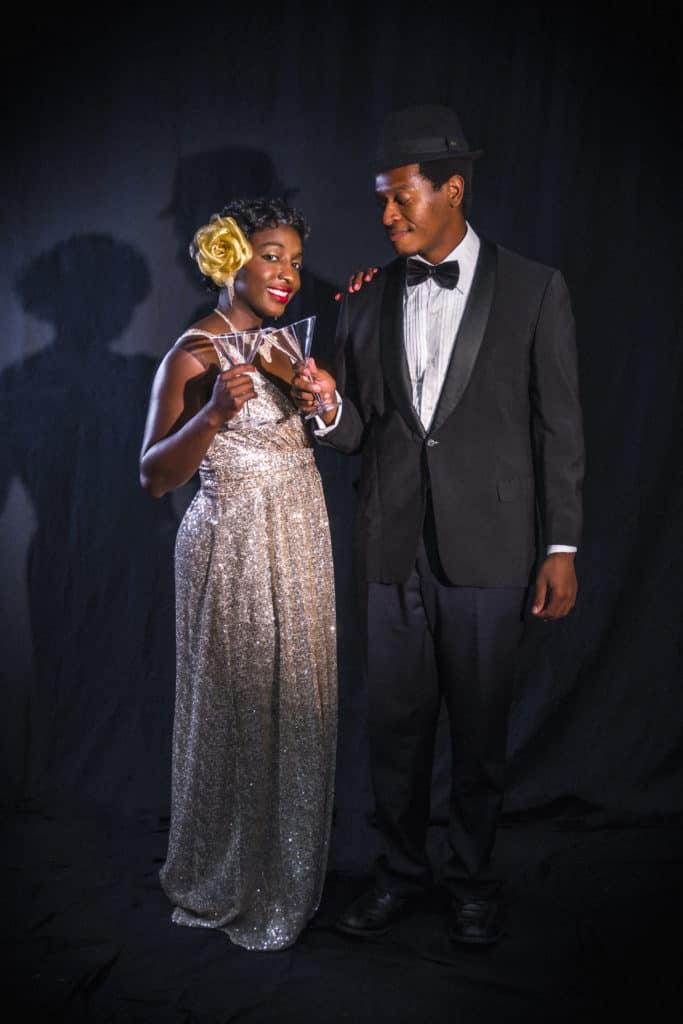Colonial Players’ By the Way, Meet Vera Stark

in Colonial Players’ By the Way, Meet Vera Stark. Photo by Brandon Bentley.
For some, the Golden Age of Hollywood wasn’t so golden
By Jim Reiter
By the Way, Meet Vera Stark, is an often hilarious look at a serious topic: 1930s Hollywood’s shoehorning of African Americans into roles subservient to whites. Written by Lynn Nottage, the only woman to twice receive the Pulitzer Prize for Drama, it is a comedy with a serious undertone of social commentary.
Colonial Players opened their production of Nottage’s comedy last weekend. The author’s emphasis on humor makes it easier to feel the frustration of talented people who, because of their color, had no opportunity to fully display that talent.
Director Eleanore Tapscott uses the comedy to probe the lives of those whose ambitions must be tempered by how much of their dignity they are willing to sacrifice in order to be successful.
The show opens with a young Vera Stark helping her white employer, Gloria, a successful yet ditzy and spoiled actress, with her lines for an upcoming movie. We immediately get a taste of what this show is going to be about as Vera’s “acting” voice, as the Black maid in the scene, is a far cry from her normal voice she uses with Gloria, who also happens to be a long-time friend. Vera ends up cast as the maid, the movie is a hit, and 70 years later film buffs are left to debate the meaning of it all.
As Vera, Ashley Simon leads a sparkling cast that propels Colonial’s production. Simon is magnetic, giving Vera a substance and weight from which her humor can soar. Sarah Wade’s Gloria (once known as “America’s Little Sweetie Pie”) is the typical blonde bombshell who appears too wrapped up in herself to really care much about her friend’s ambitions.
The rest of the cast shines as well, playing double roles as the script moves from 1933 to 1973 to 2003 and back. As Vera’s roommates and fellow aspiring actresses, Tracy McCracken and Colleen Isaiah are excellent. McCracken’s Lottie is a force of nature every time she is on the stage. Isaiah’s saucy Anna Mae, a light-skinned African American, climbs the ladder of success by pretending to be Latino. Rick Estberg as the producer, Joseph T. Smithey as Leroy, his driver and soon-to-be Vera’s paramour, and Tom Wyatt as the director are a fine supporting cast.
In the second act we are transported to a 1973 talk show, Vera’s last public appearance, and simultaneously a 2003 seminar of film buffs and experts examining that appearance as well as old footage. Here the cast’s versatility is highlighted: On the talk show, Estberg becomes the plaid-clad host, and Wyatt morphs into a hip rock star. Meanwhile, Simon’s Vera is turned into a flamboyant diva and Wade’s Gloria a hypocritical has-been. Watching this, and debating Vera’s career and what happened to her in later life, are Smithey as a filmmaker/entrepreneur, and McCracken and Isaiah as panelists, both hawking their books and loudly asserting their views. It’s a very effective scene thanks to the impressive acting and the direction of Tapscott, who sets the 1973 show and the 2003 seminar across from each other on the stage and uses lights to separate them.
Projection screens throughout the theater allow us to watch old footage of the 1930s hit movie while it is discussed by the panelists. We also see Smithey’s heart-wrenching, beautifully performed interview with a much older and broken down Leroy. Kudos go to Colonial’s technical crew for shooting and “broadcasting” these scenes as effectively as if they were taken from a Turner Classic Movies’ vault.
The show isn’t perfect; while Tapscott does a fine job directing for Colonial’s in-the-round stage, I did wonder why the talk show host remained mostly seated, rather walking the stage, a la Phil Donahue; that could have opened the scene up to more of Colonial’s surrounding audience.
Costumes by Christina McAlpine and Linda Swann are spot-on, elegant for the 1930s and embarrassingly appropriate for 1973 (yes, we really wore that stuff). Edd Miller’s set design is beautiful and inspired, especially the 1930s decor. Unfortunately some of the audience during one early scene stares at a large platform of uncovered plywood stored on stage behind a couch. And others faced the empty back of an old radio that was unrealistically filled with a flimsy piece of cardboard. Minor but avoidable imperfections in an otherwise excellent production technically and artistically.
Led by Simon’s strong performance as Vera, By the Way, Meet Vera Stark at Colonial Players is very funny, very compelling, and very real.
About two hours and 20 minutes with one intermission; runs through November 13. Tickets are $23; masks must be worn. RSVP: 410-268-7373 or visit www.thecolonialplayers.org.
